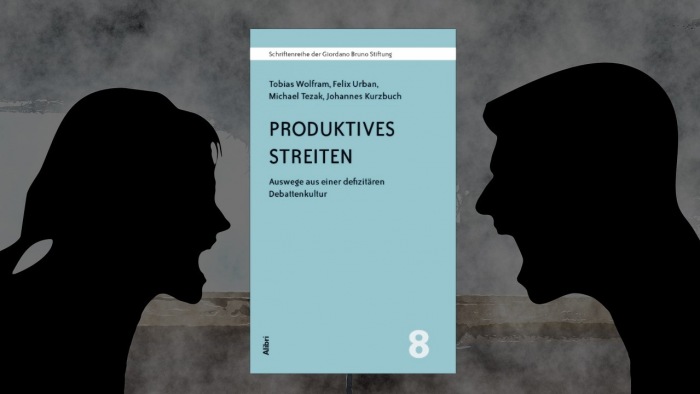The Art of Productive Debate
Volume 8 of the gbs publication series explains how rational debates can flourish
"The German debate culture is in crisis. People are talking at each other instead of arguing productively with each other." The eighth volume of the gbs publication series, which has just been published, begins with this statement. In their concise text, the authors Tobias Wolfram, Felix Urban, Michael Tezak and Johannes Kurzbuch not only examine the causes of the debates of today, which are often very unproductive, but also point out ways in which we can overcome this calamity.
"It's the right book at the right time - a clever alternative to the dangerous collective thinking patterns that are becoming increasingly widespread," says Michael Schmidt-Salomon, philosopher and spokesman of the Giordano Bruno Foundation. "I am particularly pleased that authors well under the age of 30 have tackled the important issue of rational debate culture here. That gives hope. It shows that there are also people in the younger generation who have recognized how important it is to argue rationally and on the basis of facts, instead of being outraged with moral zeal about the alleged wickedness of 'the others'!"
The book project emerged from last year's gbs summer forum, to which the Foundation had specifically invited talented young people. This year's gbs focus topic "The fine art of rationality: facts, fakes and perceived truths" was also determined at this meeting, for which the group around Tobias Wolfram was to draft a text for a brochure. " Eventually their manuscript grew so much that we decided to publish it as part of the gbs publication series," explains the foundation's spokesman. "As a result, Tobias Wolfram, Felix Urban, Michael Tezak and Johannes Kurzbuch now join the ranks of such prominent figures as Richard Dawkins, Karlheinz Deschner, Peter Singer, Volker Sommer, Gerhard Vollmer, Hamed Abdel-Samad and Ensaf Haidar - which I hope will encourage other young authors to join the debate with their own contributions".
Commitment to a rational debate culture
In connection with the publication of the eighth volume of the gbs publication series, Schmidt-Salomon referred to the "Appell für freie Debattenräume" ("Appeal for Free Debate Spaces"), which journalists Milosz Matuschek and Gunnar Kaiser initiated a few weeks ago: "With Hamed Abdel-Samad, Andreas Altmann, Reinhard Merkel, Axel Meyer, Jacqueline Neumann and myself, no fewer than six gbs members are among the first signatories of this appeal, which is now being supported by a further 16,000 people. Especially authors like me, who are considered part of the 'left' or 'left-liberal' spectrum, have been put under pressure in recent weeks because we are supposedly 'making common cause with the right'. This accusation precisely reflects the absurd group thinking mentality against which the appeal is directed. Rational leftists should understand that an argument is not wrong just because it comes from Birgit Kelle or Peter Hahne, for example. And they should understand that 'right-wing thought patterns' are not transmitted by 'droplet infection', which is why the concept of 'guilt by contact' is completely unrealistic.
For Schmidt-Salomon, the strength of the appeal lies exactly in its heterogeneous character: "The list of first-time signatories includes personalities with whom a 'free thinker' likes to be mentioned in the same breath, such as John Cleese ('Monty Python') or Günter Wallraff, but also people with whom I have absolutely nothing in common when it comes to ideology or politics - besides the position that it is better to argue with one another than to stifle any controversial debate in the course of an escalating 'cancel culture'. I have strongly advocated this critical rational approach, which motivates us to engage in debate, especially with those who disagree, in my book entitled 'Die Grenzen der Toleranz - Warum wir die offene Gesellschaft verteidigen müssen'. And it is this approach that the authors of the eighth volume of the gbs publication series now adopt in an exemplary manner, whose crystal-clear analysis I can only recommend to anyone who is interested in the fundamentals of a rational debate".
 Tobias Wolfram, Felix Urban, Michael Tezak, Johannes Kurzbuch
Tobias Wolfram, Felix Urban, Michael Tezak, Johannes KurzbuchProduktives Streiten
Auswege aus einer defizitären Debattenkultur
Alibri/Denkladen 2020, 84 pages, Euro 7.-
(Available exlusively at denkladen.de)
Addendum: As was to be expected, the reference to the "Appell für freie Debattenräume" has sparked some discussion. Michael Schmidt-Salomon addressed the main objections on his Facebook page (1. "Cancel Culture does not exist or is unproblematic"; 2. "It is wrong to support an appeal that is also supported by political right-wingers"). Here we document a translation of the most important aspects of his arguments:
(...) I believe I must clarify once again what the point is: events with Mina Ahadi and Hamed Abdel-Samad were cancelled because leftists (!!!) accused them of being racists (!!!). The gbs university group in Mainz was stripped of its university group status by the ("left") General Students' Committee because the group refused to distance themselves clearly and unequivocally from, among others, the gbs and Hamed Abdel-Samad! The Humanistic Press Service has been punished by Facebook because some people (right and left) felt "offended" by Perscheid's cartoons, etc. A culture of debate can certainly not flourish like this! (...)
Regarding the right wing among the first signatories: The right's current outcry is caused by the fact that they are now confronted with the same censorship methods that they have previously used quite rigorously against us (e.g. with the help of § 166 StGB). Nevertheless, right-wing censorship attempts cannot be fought by opposing left-wing censorship attempts, but by overcoming these camp thinking patterns and resolutely standing up for a productive culture of debate of the Enlightenment. (...)
As for the left-wing critics of the appeal: in the "left-wing community" you learn that you must never, ever work alongside right-wingers. Why? Because they are supposedly strengthened by (even partial) cooperation - and weakened by rigorous exclusion. But is this a rational, empirically proven thesis? No, quite the contrary. It is merely an expression of our evolutionary tribal thinking rather than a rational political consideration. Wherever we look, we can see that exclusionary camp thinking has led to the strengthening of the right and the polarization of society. The reason is obvious: Those who are not able to admit that right-wing forces are right where they are right, give them the very best support, because they can achieve whole successes with half truths (...).
If only right-wingers had signed the "Appell für freie Debattenräume", we would have left this territory to them as well, which would have been a fatal strategic mistake! Emancipatory thinking can certainly not prevail through a "left-wing offer of purity" (only talk to those who more or less agree with you!) - even if the "left-wing gut feeling" (which in the sense of Kahnemann's "fast thinking" is based on emotinal imprints from the past) may give us a completely different picture. Conclusion: We should keep debate spaces as open as possible - and only "cancel" (but then with every means available under the rule of law!) where there are calls to violate the rights of third parties (there is no right, however, to "not getting offended" in general in the open society, since this would undermine all freedom).


